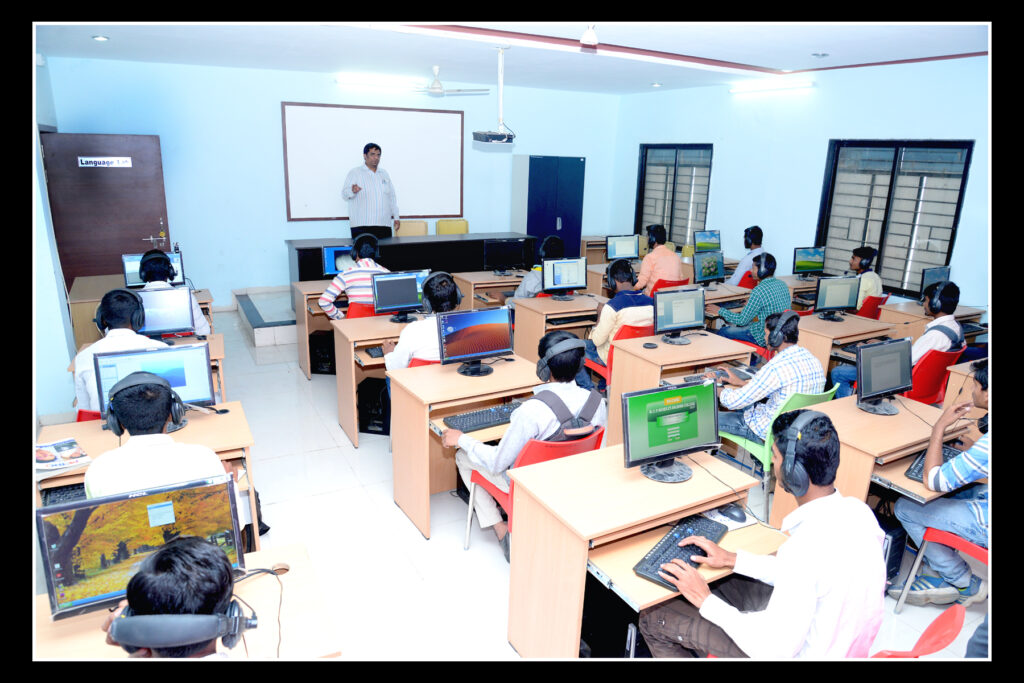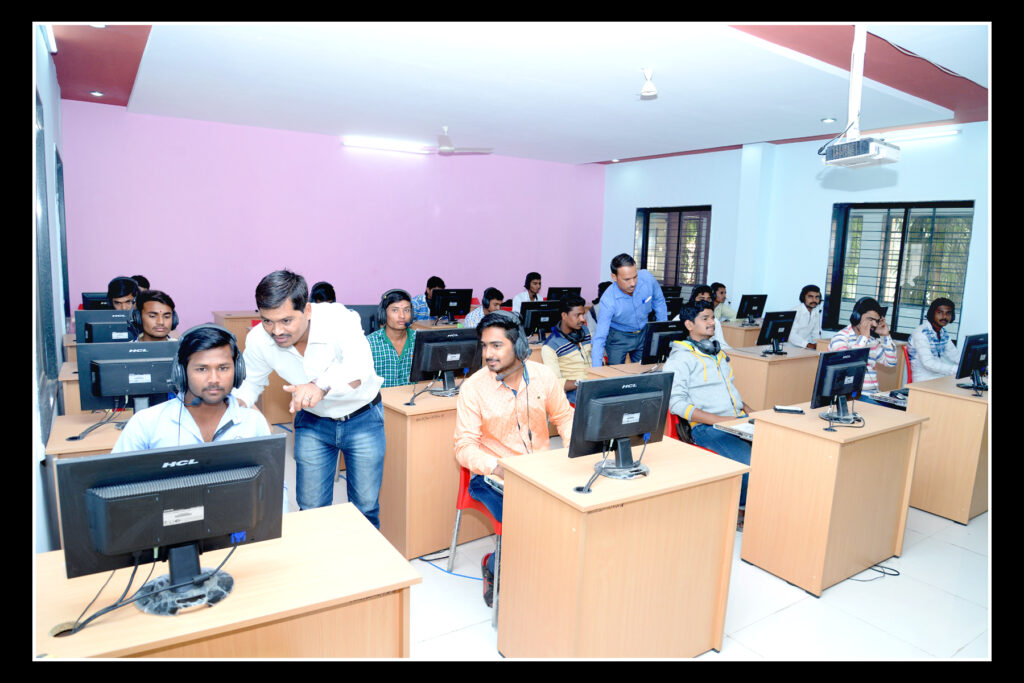
DIGITAL LANGUAGE LABORATORY
(Spoken English and Phonetics and Introduction to Grammar and Communication Skills)
English Language Laboratory for computer Assisted Language Learning:The Department of English Language & Literature of MarathwadaShikshanPrasarakMandal’sBalbhim College, Beed under the Digital Language Laboratory has introduced following courses:
- Introduction to Spoken English and Phonetics
- Introduction to Grammar and Communication Skills
- Personality Development Programmes
Keeping in view the increasing importance of English for career purpose we have a well-equipped English Language Lab with the software provided by Orell Digital Language Laboratory (ODLL) installed in multimedia computers. The software consists of interactive learning kits which help student enhance their verbal and written communication in English and thereby their employability.
- Goals & Objectives:
- To help the students develop literary sensibility, critical thinking, and sharp, penetrating understanding of a wide range of English Language.
- To develop a higher degree of proficiency in Listening, Speaking, Reading and Writing in English.
- To give edge to the student in the day to day life.
- To build communication skills and presentation skills
- To make students well equipped in the throat cut competition.
- To give them international access to world of opportunities.
- To build up self confidence among students in regard with English Language
- To make students able to read, write, speak English perfectly
- To make students familiar with English pronunciation pattern
- To develop communication skills among students
- To help students in Personality Development
- To prepare students for Job Interviews
- To make all-round development of the students.
Resources:
- 25+1 Computer Systems
- 25+1 Head-phones
- 01 web-cam
- 25+1 Chairs
- Software: Orell Digital Language Lab’s Odll Solutions for Language Learning
Course Contents:
- Basic skills in language:
LSRW: Listening, Speaking, Reading and Writing:
- Listening:
Throughout the course, listening will be a part of activities at every level and the goal will be to provide the learners with enough samples in order to encourage auditory perception and discrimination.
- Speaking:
(Practice of spoken English) Activities based on various functions, situations and clarification of speech sound, stress and intonation.
- Reading:
Tasks in reading comprehension followed by exercises.
- Writing:
Various levels of writing tasks and activities, sufficient to cater to the needs of the scholars.
- Basic and Advanced Grammar
- Tenses
- Intensive practice of Situational Conversation
- Pre-recorded audio lectures
- English Pronunciation
- Communicative Video Clips
- Job Interview Techniques
- General Knowledge & Aptitude
- Methodology:
Dialogues, “role-play in simulated situations, discussion, mini-projects, paper writing and presentations, short talks, reading articles from journals and newspapers on various themes. Activities for the practice of each of the four skills will include input from essential grammar and vocabulary
.The activities will include the following:
- Reading letters of application, resumes etc., job and person descriptions.
- Writing a Resume or CV.
- Introducing one-self and others in formal and informal situations. Face to face and on the telephone. Social interaction in English
- Describing interests, hobbies, people, places, objects, work etc. in conversation.
Giving brief written descriptions.
- Asking for information, giving information and directions on the basis of reading a map, timetable, travel brochure etc. Explaining tables, charts and graphs in both spoken and written form. • Making arrangements and plans – for a visit by someone to another place, travel for business, holiday or conference.
- Socializing, Extending and Accepting/Refusing invitations. Expressing support and dissent in informal situations.Greeting and leave taking, narration of events, fruitful communication.
- Inviting papers for publication, presentation. Giving directives, Issuing instructions. Seminars and presentations: Preparing for a presentation writing a brief paper for presentation. Making a presentation: voice and posture.Reading/Addressing.Listening & Note-taking.Negotiating.Group Discussion–Initiating–Participating in winding up a discussion.Role play Pair work/Group work
Testing and Evaluation: A diagnostic test will be conducted at the onset and learners will be informed of their ability level according to a fixed grading system. This test will be for all four modules and will take three hours to administer. At the end of the course , a test along the same lines will be administered and the certificate will state clearly the changes in the abilities of the candidate. Introduction to the four skills of language and the importance of each.Eliciting responses from students on their expectations from the course. Play some samples of good spoken English. Standard English and a variety of samples should be the goal. Some exercises in listening comprehension. Some more samples of spoken English Comprehension activities involving speaking and writing should be the classroom work. Pair work and group work involving listening comprehension. Since each student represents a different variety of English, each can give a short speech to encourage the others to listen carefully. Through speaking and writing in listening comprehension, a rough evaluation of each student can be attempted.
The class is introduced to the English Pronouncing Dictionary (Daniel Jones) and is instructed in the correct use of this text. In pairs, students are asked to look up certain words in the dictionary and get familiar with its layout. The students are given the background of the phonetic symbols given in the beginning of the dictionary and are given a demonstration of the use of the dictionary for pronunciation. The teacher looks up certain words in the dictionary and encourages the students to use the dictionary independently. A small test is administered to check their comfort level with the dictionary. A Practical Course in English Pronunciation (SethiSadanand and Dharnija) is introduced in the class and students are given tips on how to use the book, taking tips from the introduction of the book. All through the coming weeks, this book and the dictionary will be used in conjunction. The teachers must use the C.D’s with the books, individually in groups, in pairs or the whole class, depending upon the context.
During the academic year 2020-2021 hundred students registered for the course of Introduction to Spoken English and Phonetics and Introduction to Grammar and Communication Skills under the English Language Laboratory of the Department of English Language & Literature of this college.

- Schedule for Students :
| Faculty | Day | Time |
| Humanities | Monday to Saturday | College Time: 07:00 am to 08:00 pm |
| Commerce | Monday to Saturday | College Time: 07:00 am to 08:00 pm |
| Science | Monday to Saturday | College Time: 07:00 am to 08:00 pm |
Overall Outcomes:
- Life Skills
- Grammar and Development of Skills
- Grammatically Correct Sentences
- Able to Talk in English
- Writing Skills developed
- Pronunciation Skills
- Attempt to speak correctly
- Could comprehend foreign accent of English
Future Plans:
- To Strengthen the laboratory facility for students
- To put more efforts to make students perfect in English language
- To increase the number of placement of students during campus drives by equipping them with communication and presentation skills.
- To start a center for the study of regional languages and literatures with translation as well as Comparative Studies
- To introduce the courses in foreign languages and literatures
- Designing multimedia packages, web-based courses and materials for use in language laboratory
- Undertaking collaborative efforts with other language & literature centres in India and abroad
- Promoting research in emerging areas of SF, ELT, CALL, Online Media & Blended Learning
“In my end is my new beginning” – T. S. Eliot, a Nobel Laureate.
The woods are lovely, dark and deep,
But we have promises to keep,
And miles to go before we sleep,
And miles to go before we sleep…. Robert Frost.
